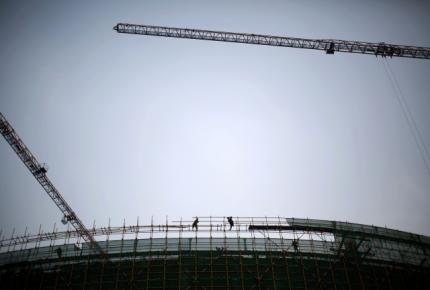China Factory PMI Unexpectedly Rises In Sept
China Sept factory activity edges up on stronger orders but employment shrinks

China Sept factory activity edges up on stronger orders but employment shrinks
Bareksa.com - The HSBC/Markit Flash China Purchasing Managers' Index (PMI) rose to 50.5 in September from 50.2 in August, beating analysts' expectations for a reading of 50, as orders increased.
The PMI survey also showed that a factory employment index slumped to a 5-1/2-year low.
"The picture is mixed, with new orders and new export orders registering some improvement. Meanwhile, the employment index declined further and disinflationary pressure intensified," said Qu Hongbin, an economist at HSBC.
Promo Terbaru di Bareksa
Finance Minister Lou Jiwei said at the weekend he would not dramatically alter policy because of any one economic indicator, cooling any speculation of swift, aggressive action to boost growth.
Most Asian stock markets and the Australian dollar clawed back some of their early losses after the PMI report, while Shanghai stocks rose.
Despite a raft of stimulus measures earlier this year, the world's second-largest economy has stumbled as a slowdown in the housing market further undermined already softening domestic demand, while exports have faltered.
Worries that China was slipping into a deeper funk heightened this month when data showed factory output grew at the weakest pace in nearly six years in August as growth in other key sectors also cooled.
China's urban unemployment rate was nearly 4.1 percent at the end of June, though many economists believe the real number may be much higher given its army of migrant workers.
But the employment index aside, other measures in the PMI poll fared better, which could keep Beijing's response more modest for now.
Total new orders rose, and new export orders also climbed to their highest level since March 2010.
The overall output level remained flat on the month, while output prices fell to a six-month low.
The final HSBC/Markit manufacturing PMI for the month is due on Sept. 30, while the official reading will be released on Oct. 1. The HSBC surveys covers more small to medium-sized companies, which are believed to be under far more stress than larger, state-owned firms which the official report tends to focus on.
The run of weak data has fed speculation that authorities may further loosen fiscal and monetary policies to shore up growth. The property slowdown, in particular, is expected to persist well into next year and continue weighing on demand for everything from household appliances to glass, cement and steel.
Prices for Chinese steel and iron ore futures have slumped to record lows, while oil, copper, rubber and other raw materials have also skidded on fears of slowing China demand, which is rapidly leaving the United States as the only major driver of world economic growth.
But Chinese leaders have publicly ruled out another massive stimulus programme like the one launched during the global financial crisis, which left local governments saddled with mountains of debt, encouraged excess capacity in some industries and fueled inflationary pressures.
Instead, Beijing has rolled out a series of more modest steps targeted at supporting more vulnerable sectors of the economy, while many local governments have eased curbs on property purchases in the face of sliding home prices and a sharp drop in new construction.
Premier Li Keqiang said earlier this month that China cannot rely on easy credit to fuel its economic growth, and said the country would only tweak policy in certain areas to aid activity.
Further measures are already being rolled out even as leaders publicly advise caution.
The central bank last week injected money into the country's top banks in a bid to help support the economy by keeping borrowing costs down, and media have reported this week that the "Big Four banks" plan to ease rules on mortgage lending in a move orchestrated by regulators. (Source: Reuters)
Pilihan Investasi di Bareksa
Klik produk untuk lihat lebih detail.
| Produk Eksklusif | Harga/Unit | 1 Bulan | 6 Bulan | YTD | 1 Tahun | 3 Tahun | 5 Tahun |
|---|---|---|---|---|---|---|---|
Trimegah Dana Tetap Syariah Kelas A | 1.385,6 | ||||||
Trimegah Dana Obligasi Nusantara | 1.095,56 | - | |||||
STAR Stable Amanah Sukuk autodebet | 1.085,51 | - | - | ||||
Capital Fixed Income Fund autodebet | 1.854,58 | ||||||
Insight Renewable Energy Fund | 2.288,82 |

Produk Belum Tersedia
Ayo daftar Bareksa SBN sekarang untuk bertransaksi ketika periode pembelian dibuka.

Produk Belum Tersedia
Ayo daftar Bareksa SBN sekarang untuk bertransaksi ketika periode pembelian dibuka.